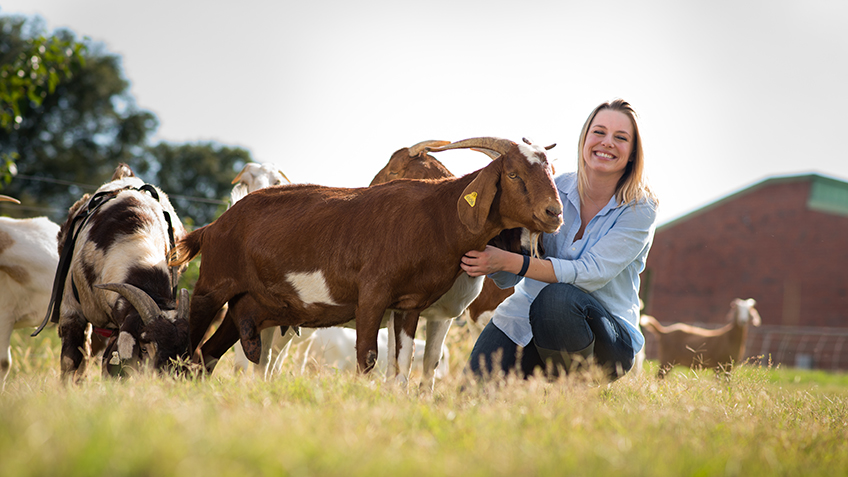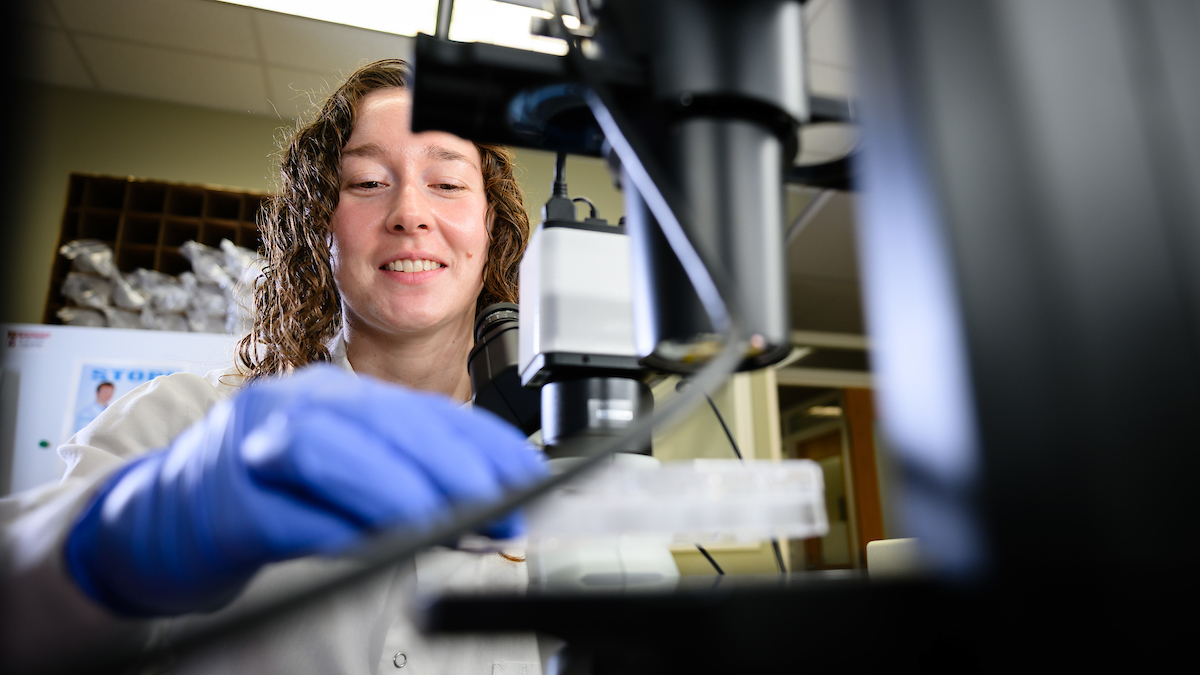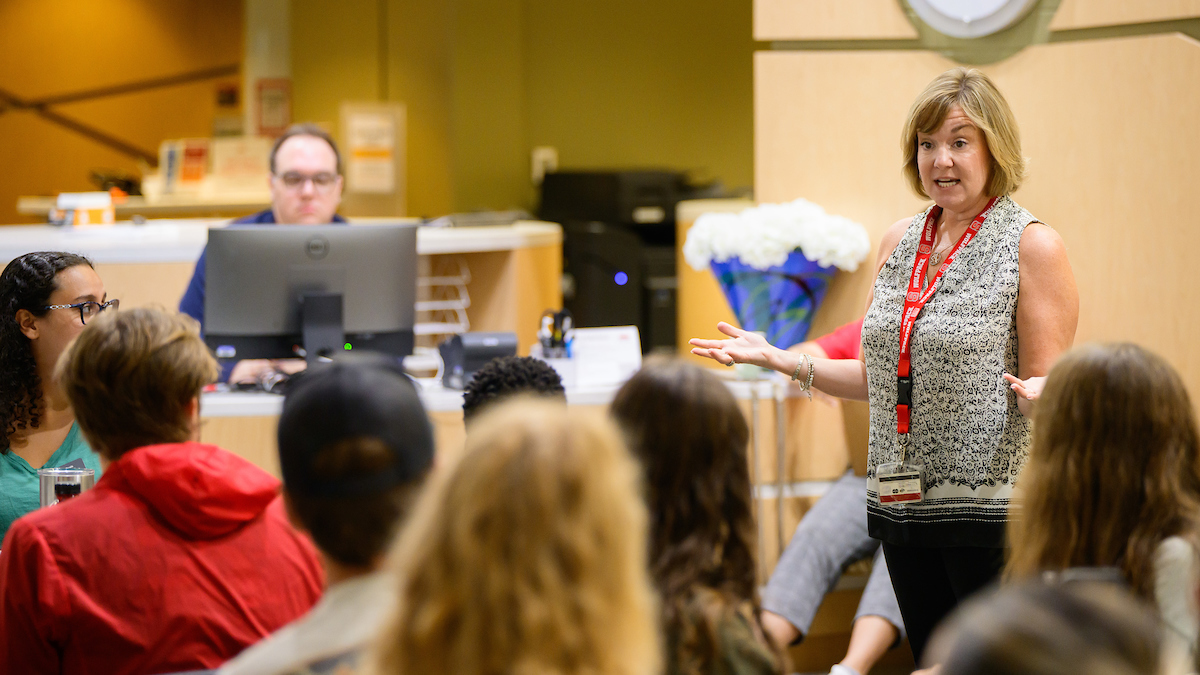Class of 2020: Strength in Service

Amie Pflaum has the right to brag. She just never would.
It’s just not her style. So yes, if you ask, she’ll talk about being in the Army, about piloting a Blackhawk helicopter at 23 years old, about humanitarian missions in Guatemala and her time embedded in a village in Vietnam and serving in the war in Afghanistan.
If you ask, she’ll talk about her stint as an assistant professor of military science in Wisconsin and earning a degree in political science from Wake Forest University on a full ROTC academic scholarship. She may even mention the scholarship she has now from the Tillman Foundation, supporting military veterans committed to service.
She’ll talk about these things, but she’ll do so in a way that’s somehow relatable even though her experiences are far from average. She discusses her life in a humble manner that still relays a sense of pride, of duty and service. She’s equal parts down-to-earth and inspiring.
[cvm_video id=”H7JKt739I1o”] [/cvm_video]
And you admire her. Though she’s served successfully for more than a decade in the Army, she was unafraid to not just make the transition to the civilian side, but to fully devote her energies to a new kind of challenge: joining the class of 2020 at the North Carolina State University College of Veterinary Medicine (CVM).
“I fought for years to be here at NC State,” says Pflaum. “I’m so excited that my dreams are coming true.”
Pflaum, who now flies with the North Carolina Army National Guard, is working toward a career as a public health veterinarian. After her studies at the CVM, she hopes to return full time to the Army as part of its Veterinary Corps. The 32-year-old native of La Plata, Md., first experienced such civil action program trips in the military, flying humanitarian teams to developing nations. Now, Pflaum is compelled to make a direct impact on the ground.
During these trips, Pflaum witnessed everything from setting up sustainable agriculture and building irrigation systems to bringing in much-needed dentists and pediatricians. She watched as veterinarians immunized animals and talked to local communities about how to take better care of livestock.
“I had the opportunity to observe and to learn and it had a really profound impact on me, to see just what this work can do,” she says.
[pullquote color=”blue”]“Living in these developing nations and seeing the first-hand effects of a positive public health influence has made me realize this is how I want to contribute…”[/pullquote]
It’s work Pflaum doesn’t just want to do; it’s work she feels she needs to do. She never wants to stop making an impact, and feels focusing on global health issues through her studies at the CVM will best prepare her for this new mission in a life full of astounding missions.
“Living in these developing nations and seeing the first-hand effects of a positive public health influence has made me realize this is how I want to contribute … this is the area and the arena that I want to work in for the rest of my life.”
It started with horses. As a child, Pflaum boarded as a member of the United States Pony Club, a program focused both on how well youth take care of horses as it does riding and competing. Pflaum rode from the age of 8 up through college, and horses forced her to deal with some pretty tough things. One of her horses had a rare disease that took two years to diagnose, and veterinarians were not able to help the horse overcome the illness. A year later, Pflaum was in a jumping accident with her new horse.
She spent a year helping her horse recover, going to the barn before school and right back out after classes. There were many injections, lots of wrapping — and a growing appreciation for veterinary medicine.
“I was heartbroken, but I think that made me appreciate how challenging the profession is,” says Pflaum. “That definitely solidified my commitment and love for animals, my love for medicine, my appreciation of medicine. I think had those things not happened that I would not find myself here today.”
Pflaum originally wanted to be an orthopedic surgeon for humans, inspired by her own doctor who happened to serve in the Army. He encouraged her to look into a military career, and Pflaum was already thinking about serving before Sept. 11. The terrorist attacks, which happened during her senior year of high school, “sealed the deal” for her. She joined, and the Army paid for her undergraduate studies Wake Forest University, where she eventually earned a degree in political science. As an undergraduate, she served as a Army ROTC Cadet Battalion Commander and captain of the dressage team.
[pullquote color=”blue”]”I realized so much of what I learned over the past 14 years I can absolutely bring into this profession. And it’s going to make me a better vet.”[/pullquote]
At first, Pflaum intended to go to medical school to become an Army physician. But that would have meant many more years of schooling, with Pflaum sidelined from action as the wars in Iraq and Afghanistan were kicking off. And Pflaum is not the type of person content on waiting when she has her mind set on something — especially when it comes to serving.
She didn’t want to delay starting to make the type of impact she desired to, and she didn’t have to wait to get started in aviation. She’s never regretted it. Piloting has given her a chance to serve her country while learning more about the people she wanted to help.
Eventually, she faced a crossroads. Pflaum had concluded her company command in Honduras, and at that point officers often look for broadening opportunities. She had many options, including pursuing a master’s in strategic studies, teaching at West Point or serving in a foreign embassy.
But with veterinary medicine never far from her mind, Pflaum transitioned into academia, running the ROTC programs at St. Norbert College in De Pere, Wisc., and the University of Wisconsin-Green Bay. While teaching, she became a student again herself, taking prerequisite classes for veterinary school. In 2013, she also transitioned from active duty to the National Guard
“I knew it was now or never, and I had to make the transition back to school full time,” she says. “That’s when I moved to Raleigh, which was very strategic because I wanted to go to NC State,” she says.
[pullquote color=”blue”]”This was the first time where I said, this is incredible. I want to learn about this. I want to study. I want to get invested in this.” [/pullquote]
For the next few years, she plunged into preparing for veterinary school in what she calls an informal post-baccalaureate program while serving in the National Guard. Everything was exciting and intriguing: various programs at NC State’s College of Agriculture and Life Sciences (CALS), One Health and Reproductive Physiology classes and meeting professors who would quickly become mentors.
“That was the first time in school where, I’ll be honest, I was truly excited about learning,” says Pflaum. “This was the first time where I said, this is incredible. I want to learn about this. I want to study. I want to get invested in this.”
Particularly impactful was volunteering at the college’s Small Ruminant Education Unit. She loved working with sheep and goats, animals she’ll frequently encounter on Army humanitarian missions as a global public health vet. But more importantly, she says, she met both an incredible group of students and the education unit facility manager at the time, Bill Knox, who has since retired.
“He was a mentor,” Pflaum says. “Yes, he managed the farm, yes, he managed the animals, but he also mentored us and he developed this strong and capable community of volunteer students.
“Learning from Bill and learning from those other students — I’m fortunate that I had that opportunity.”
If you would never have thought a Blackhawk pilot would pursue a career in global public health, or that a global public health veterinarian would still want to fly Blackhawks, you’re not alone. Pflaum felt the same way, questioning how she could have picked two more unalike careers.
But the more she thought about it, the more she realized how similar they are.
“And that’s going to sound crazy,” she says. “But think about an operating room in surgery versus what I do in a cockpit of an aircraft and commanding that flight and commanding that surgical procedure — it’s the same principles of a life is at at stake if we don’t do this right. We need to exercise teamwork, we need to communicate, we need to problem-solve together. We cannot be indecisive. We need to be mature and disciplined and responsible.
“So yes, it seems very different. But I realized so much of what I learned over the past 14 years I can absolutely bring into this profession. And it’s going to make me a better vet.”
Yes, Pflaum will talk about her ever-present passion and talent. You just need to ask.
[highlight color=”gray”] [fa_icon name=”fa fa-newspaper-o fa-fw” size=”1x”] Following the class of 2020:
Our look at Amie Pflaum is the sixth in a series looking at wide-ranging ambition and extraordinary talent of the North Carolina State University College of Veterinary Medicine class of 2020.
[/highlight]
~Jordan Bartel/NC State Veterinary Medicine
- Categories:


